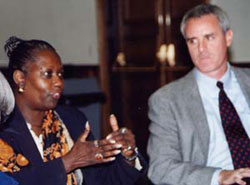Strengthening Community at TC: Informal Conversations
In the first of a series of College conversations, "Strengthening Our Community: Communicating Across Differences," faculty, staff and students gathered to talk about how the September 11th attacks will affect the TC community not only as a individuals, but as a nation and as a world.
Peter Coleman, Director of International Center for Cooperation and Conflict Resolution and Assistant Professor of Psychology and Education moderated the group discussion. Lee Knefelkamp, Professor of Higher Education, and Derald Wing Sue, Professor of Psychology and Education, provided reflective thoughts.
Janice Robinson, Assistant and Special Counsel to the President, introduced Francis Schoonmaker, Professor of Education, who made the opening remarks.
Although the attacks made us realize how much we needed each other, Schoonmaker noted that the tensions and challenges of daily living have increased.
Individually, she said, we have to look at the nature of truth and how we see it.
Our basic ideas and truths don't always square with other people's ideas. She asks, "How do we hold on to what we feel is precious, but leave room for other people's ideas?"
Community is important, she said, but it comes at a price. When people come together views will be shared that some might not agree with.
"However, we are all in a common mission together-education," said Schoonmaker. "We are all dependent on each other, and we don't have all the answers, but we can support the questions."
Noting this heightened sense of community after the attacks, Wing Sue said that initially he was happy with the initial sense of patriotism. But, he asked, when is patriotism not good?
"If we can learn from one another-value and understand different viewpoints," he said, "then we will be able to overcome this."
Knefelkamp also noted the importance of understanding others. During acts of violence like these, people forget who they are and that they are a complex and diverse group under great stress. She mentioned that academics are being called unpatriotic for raising complex issues surrounding these events.
"We come to TC," she said, "because we welcome differences, debate and discuss beliefs, but now it's under attack."
"This may have happened to a nation, but it also happened to real people," she added. "With this pain it's hard to understand these complexities, but we should continue to have these conversations."
Published Monday, May. 20, 2002
